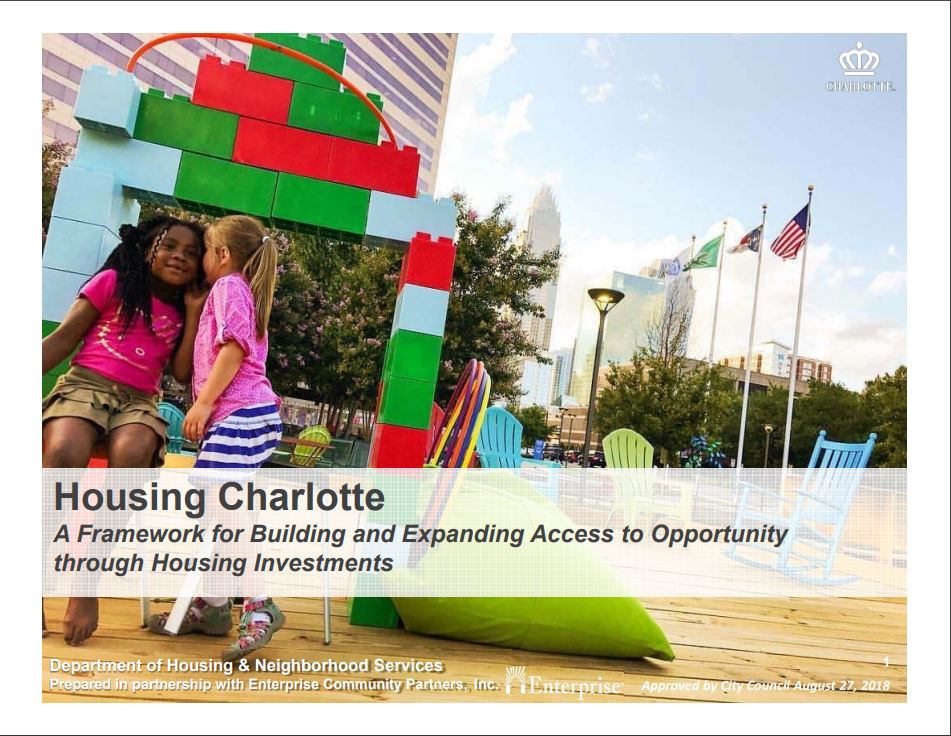Planning Home Case Study: Charlotte, North Carolina
A New Model for Collaboration
Community Challenge

Charlotte, North Carolina
As is the case in many metropolitan areas, the rate of growth in household income in Charlotte, North Carolina, has lagged compared with increases in housing prices.
Since 1990, census data shows home values and rents have increased by 36 percent and 24 percent, respectively, while median household income has increased by 4 percent. The city's housing planners estimate a current deficit of about 24,000 units for households at or below 50 percent of area median income while more than 30 percent of households currently spend more than one-third of their monthly income on housing.
A 2016 study by the Charlotte nonprofit advocacy group Leading on Opportunity brought new attention to the city's long history of racial segregation and its effect on residents, noting, "Maps of our county consistently reflect a 'crescent' of lower-opportunity neighborhoods dominated by people of color in contrast with a 'wedge' of white, wealthier residents in south and north Mecklenburg."
The good news is the city has forged a collaborative plan with private-sector and nonprofit partners that will result in substantial new investment in housing affordability in the coming years.
Planning Solution
Voters demonstrated their commitment to the issue in November 2018 by approving the sale of $50 million in municipal bonds for the local housing trust fund. Those funds will be matched dollar for dollar by the Foundation for the Carolinas.

Charlotte, North Carolina.
Then in January 2019 the city's largest financial companies — Ally Financial, Bank of America, and Barings — announced a commitment to invest $70.8 million in affordable housing in the city and surrounding Mecklenburg County. Those funds will be allocated in four areas:
- $50 million in below-market loans to finance affordable housing developments.
- $11 million for a new Housing Opportunity Investment Fund, which will assess affordable housing projects and find financing to execute viable projects
- $2.5 million allocated to economic mobility programming and grants over the next five years
- $7.3 million in land donations to increase housing affordability, particularly in the Uptown Charlotte neighborhood
The Charlotte office of the Local Initiative Support Corporation has been tapped to manage the $50 million loan fund. Other community partners, including the Leading On Opportunity Council, will collaborate with the city to preserve workforce housing and help households and individuals achieve financial self-sufficiency.
The framework is organized around three "pillars" (i.e., goals) that the city and its partners will use to target new investments and programs:
- Increasing capacity to serve households earning below 60 percent of area median income.
- Serving residents vulnerable to housing displacement.
- Using housing to build and expand access to opportunity.
Housing Charlotte

The City of Charlotte and the nonprofit Enterprise Community Partners released Housing Charlotte: A Framework for Building and Expanding Access to Opportunity through Housing Investments in August 2018. The framework outlines how the city will integrate its goals for affordable housing preservation and production with new private and nonprofit financial commitments to increase affordable housing production and expand economic opportunity for Charlotte residents.
Current Results
These efforts are in addition to the city's already robust affordable housing finance and regulatory tools (which are described in detail in the framework) that have worked well in their own right but are inadequate to meet ongoing and future demand. The City of Charlotte will always play a lead role implementing affordable housing programs but, as the framework states, "overall success will depend on how well the entire community collaborates to address the complex social and economic needs of people needing affordable and workforce housing."
Housing Opportunity Fund Secures Additional Donors
On June 4, 2019, the Charlotte Housing Opportunity Fund announced that an additional two donors have joined in efforts to address Charlotte's affordable housing crisis. Atrium Health and Fifth-Third Bank each pledged $10 million.
Two Companies Pledge $20 million to Address Affordable Housing in Charlotte

The Charlotte, North Carolina, skyline.

